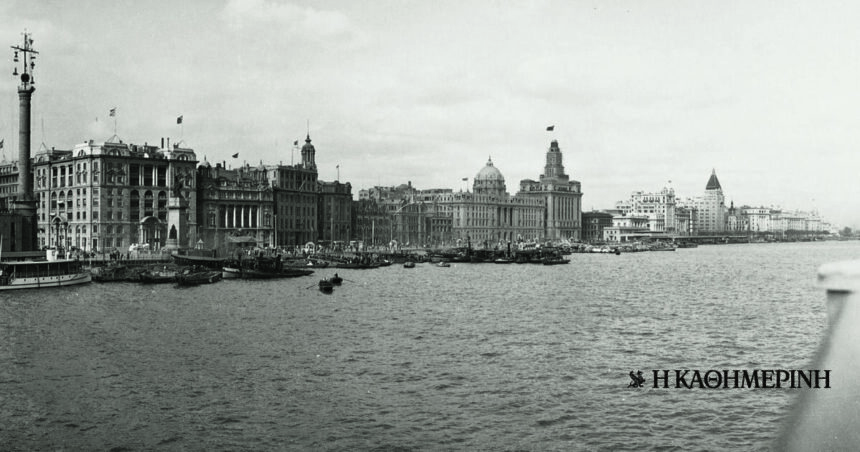On December 25, 1937, Mr captain Leonidas Bistismaster of steamship “Socrates Onassis”sailing from the Hong Kong reaches her Keelung Taiwan. He writes in the ship’s logbook: “Light wind, fair seas. A MARRY [sic] CHRISTMAS. We anchored off Keelung harbor awaiting a navigator and the local authorities.” The steamship “Socrates Onassis”, 3,336 tons, with the Greek flag and registered in the port of Piraeus, was the first ship of the later famous Greek shipowner Aristotle Onassis. The ship made repeated voyages carrying coal from Chinese to Japanese ports. On January 1, 1938 the master wrote in the diary: “At Nagoya. Happy New Year 1938. Holiday’.
But they were not the only ones Greek sailors where they were going to China the interwar period. Greeks had preceded and settled in China years before. On April 3, 1929, an article in the Greek popular “Acropolis” newspaper it was titled “Do you know that in China there are entire colonies of Greeks?”. The article was written from Shanghai, where the Greeks, as reported, on January 23, 1928, formed the “Association of Greeks of Shanghai “The Solidarity”” from the Greek communities of Mukden (Shenyang), Chefu, Qingdao and Hankou. The Greeks in Tianjin had a similar link, while Harbin was the largest Greek community in China. What did the Greeks do in China?
From two routes
Although there is documentation from Greek historians about their presence in China as early as the 18th and 19th centuries, in 20th century China the Greeks went by two routes, one by land and one by sea. Through the land route they went from the Russian Empire with the creation of the Trans-Siberian in the 1890s as suppliers – traders to Manchuria. With the October Revolution a large wave of Greek immigrants went to northern China from Russia after 1917. A large number were Kefalonites merchants settled in the ports of the Azov and Black Seas, who did not have time to leave by sea and managed to go to China by land following the old overland silk roads. This is how communities of the Greek diaspora were founded in northern China, mainly from Harbin and Beijing to Tianjin. The period of the Balkan Wars, the First and Second World Wars coincides with the era of the Republic of China (1912-1949). It is also the era of the globalization of Greek shipping. The closure of the Black Sea and the grain market radiates Greek shipping mainly in the Atlantic, but also in the Indian and Pacific oceans. It didn’t take long for Greek shipping entrepreneurship not only to expand but also to settle in China, where shipping companies, agencies, “sipsantides” (ship suppliers, from ship-chandlers), sailors are now located. They settled mainly in the southern Chinese ports of Shanghai, Guangzhou and Hong Kong.
Stands out Emmanuel Giannoulatos (1882-1955), merchant and shipowner, from the well-known shipping family from the island of Kefalonia, who immigrated to China at the beginning of the 20th century and in the 1920s settled in Shanghai. In 1932 he founded the shipping business China Hellenic Lineswhich acquired a large number of steamships. Due to his successful operations in the Far East, he was appointed Deputy Consul General of Greece in Shanghai. During his Second World War Giannoulatos moved his company to Hong Kong, while opening branches in Sydney and London.
Throughout the interwar period, a significant number of Greek-flagged ships traveled to Chinese ports conducting sea trade, not only between Europe and China but also between China and Asian ports, taking over local sea transport. They belonged mainly to large Greek shipping companies that maintained shipping agencies in London and Piraeus: such as Constantly, Vlassopoulou, Chandri, Lebanon, Goulandris, Empirikos, Rethymno and Swinging. Along with the loads, however, the ideas are also transported. The Greek ships were manned by Greek sailors, who in the Chinese ports came into contact with their Chinese colleagues. In Shanghai and Hong Kong, many Greek sailors were introduced to communism. The long economic and shipping crisis of 1929-34 led to successive strikes and widespread radical, often communist, leadership of seafarers’ unions worldwide. Sailor militancy spread, not only among Greek sailors but also among British and Northern Europeans, where communism had begun to be a political force. THE Antonis Ambatielosa Kefalonian sailor, who proved to be a leading figure in the naval communist movement during the Second World War, spent long periods of time in Shanghai.
Throughout the interwar period, a significant number of Greek-flagged ships sailed to Chinese ports and not only conducted maritime trade between Europe and China, but also undertook local maritime transport.
Mao era
The Greeks continued throughout the second half of the 20th century close maritime ties with Beijing during the period of the People’s Republic of China under the rule of the Chinese Communist Party (CCP) during the Maoist period (1949-1976), but also after , until today, despite the change of governments on both sides. After the Second World War, Greek shipping experienced a spectacular rise. Shipping offices of Greeks were established in almost all the main ports of Europe, North and South America, East and South-East Asia, South Africa and Australia. During the first two post-war decades, London and New York hosted the largest number of Greek shipping offices, with Piraeus following. From the mid-1960s onwards, Piraeus slowly but surely began to assume its pre-war importance and remains to this day the main operational center of the Greek-owned fleet.
The Greeks, as cosmopolitans and global entrepreneurs in international maritime transport, have always followed their economic interests. And they continued to do so beyond Europe’s Cold War state policy and North Americas. During the Korean War (1950-1953) the leading shipbuilder Stavros Livanosbased in New York, was accused by the US government of carrying cargo for both South and North Korea. As he transported Chinese cargo to North Korea, he was called a “red shark” by American newspapers. Greek shipowners, such as Aristotle Onassiso Stavros Niarchos or the Koulokundis brothersall based in New York, were monitored and investigated by the FBI and CIA “for dealings with the Reds.” When China was embargoed by the Americans during the 1950s, Greek ships continued to ply their trade. When Cuba was embargoed by the USA in the early 1960s, the Greeks invented the Cypriot flag with which they transported cargoes of sugar and tobacco between Bucket and Soviet Union. They did the same during his war Vietnam in the late 1960s.
China on Mao was one of the main charterers of Greek dry cargo ships. In the 1960s, it chartered more than 700 Greek ships over a number of years. In January 1969 the “Nautical Chronicles” reported that more than 400 Greek-flagged ships were engaged that month in Chinese transports or liner services. They also mentioned an interesting story, which reveals how close the relations between the Chinese and the Greek sailors were: Greek crews were surprised to be welcomed in major Chinese ports by Chinese who spoke Greek fluently. They then discovered that, due to long-standing shipping trade with Greek ships, the Chinese authorities had sent a number of their officials to Greek-speaking schools in Albania to learn the language.

In the 21st century
After the Maoist era, Greek-owned shipping continued its close ties with the Chinese economy with the same and greater dynamism. Today, 60% of China’s energy is transported by Greek-owned ships. In the 21st century, Greek-owned shipping has played an important role in the development of China’s shipbuilding industry from the 2010s to the present. Essentially, the Greek shipowners, with their orders on the one hand, their executives and engineers in the technical departments of their companies on the other, were instrumental in the introduction and improvement of technology in China’s shipbuilding industry through the interaction of Greek shipping companies with the Chinese shipyards.
In the 1950s, Greek shipping companies contributed to the development of Japanese shipyards by ordering their ships there. They were the first to turn to South Korea since the 1970s. And they were also the first to turn to China’s shipbuilding industry since the 2010s. Maritime magazine Tradewinds wrote on June 2, 2024: “Chinese shipyards dominate their rivals by securing new shipyards by Greek shipping companies worth 40 billion dollars. According to the information available to Tradewindsthe Chinese shipbuilders are building 266 of the 401 ships ordered by the Greeks in 2023 and the first four months of 2024″.
Ms. Jelina Harlautis is head of the Center for Maritime History, director of the Institute of Mediterranean Studies – ITE and professor at the University of Crete.
_______________________________________________________________________________
Central photo. : The waterfront of Shanghai photographed from inside a steamship, in 1934. Greek shipping entrepreneurship expanded mainly to the ports of southern China. [A.P.]




